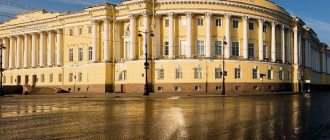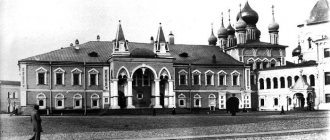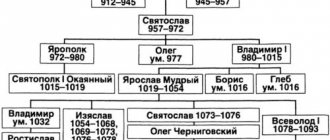Christianity is one of the world's major religions, along with Islam, Hinduism and Buddhism. It is professed by about 33% of the world's population . This religion originated a very long time ago, around 33 AD. in Palestine. As a state religion, it was first adopted in Armenia in 301 . Vladimir Svyatoslavovich brought a new faith to Russian lands . In 988, he baptized Rus', making Christianity the state religion of Kievan Rus.
Prerequisites for the emergence of a new faith on Russian lands
Prince Vladimir understood that with the scattered pagan tribes of the Slavs, a strong power could not be built . He chose a single religion , which was supposed to cement the union of the Eastern Slavs with a common idea. He doubted for a long time which religion to choose. The chronicles say that representatives of the most powerful religions at that time came to the Russian prince to persuade him to their faith.
Embassies from Muslims from Volga Bulgaria, from Khazar Jews, representatives of the Roman Church and envoys from Byzantium arrived in Kyiv. The prince also sent his ambassadors to see the rituals of religions with their own eyes and see how each religion affected the lives of the local population. After the return of their ambassadors and after a long council of the boyars, it was decided to accept Christianity of the Byzantine rite.
Cultural and ethnic implications
The adoption of Christianity led to the development of ancient Russian culture. This was expressed as follows:
- Construction of stone churches, for example, St. Sophia Cathedrals in Kyiv, Novgorod and Polotsk.
- Development of icon painting.
- The beginning of chronicle writing.
- The emergence of a literary tradition, for example, “The Teachings of Vladimir Monomakh” and “The Life of Theodosius of Pechersk”.
Russian priests, monks, bishops and even metropolitans appeared in the state, and the formation of the ancient Russian nationality accelerated. In the 12th century, the East Slavic tribes ceased to be mentioned in chronicles.
In the table, point by point, we can summarize the listed consequences of the adoption of Christianity in 988:
| Consequences | |
| Ethnic | Acceleration of the consolidation of the Old Russian people, the emergence of Russian priests and metropolitans |
| Social | Acceleration of differentiation of ancient Russian society, identification of the dominant layer, development of feudalism |
| Economic | The emergence and strengthening of land ownership |
| Political | The growth of the international prestige of the state, dynastic marriages with different European states, the strengthening of central power and the importance of the throne in Kyiv |
| Cultural | Development of ancient Russian culture, including architecture, icon painting, literature, the beginning of chronicle writing |
The first five metropolitans were Greeks, and Hilarion became the sixth. He held office for only 4 years, from 1051 to 1055. Hilarion wrote “The Sermon on Law and Grace.” After his death, he was again replaced by a Greek, Ephraim. Hilarion was installed as metropolitan by a council of Russian bishops, and not by the patriarch from Constantinople.
Rice. 3. Rus' under Prince Vladimir the Saint.
Reasons for the adoption of Christianity in Rus'
- Prince Vladimir's desire to create a strong, integral state . Pagan beliefs did not unite the Slavic peoples, but, on the contrary, caused additional disagreements between them. The prince could not sufficiently influence the warring tribes, which also posed a threat to his power. Therefore, the adoption of Christianity was supposed to unite the Slavic peoples around one religion and stop internecine conflicts.
- Vladimir understood that Russia needed strong political and trade allies . Cooperation with Europe was quite beneficial. At that time, Christianity was introduced in almost all European countries. Slavic tribes with their pagan beliefs were considered barbarians, and European peoples did not particularly strive to establish any relations with them. Therefore, the adoption of Christianity opened up the prospect of entering the international arena as an equal player.
- The Russian ruler wanted to marry the sister of the Byzantine emperor Anna . But the monarch understood perfectly well that the marriage would not take place while he himself was a pagan. This was also one of the factors that prompted Vladimir to convert to Christianity. This marriage played a significant role in the international relations of the Russian state, bringing support to Byzantium in the political arena. But in addition to political calculations, it is quite possible that he had feelings for the Byzantine princess.
- The state developed, the spiritual needs of society changed . It was necessary to move away from polygamy, strengthen the institution of family, and accept new aspects in raising children. All this was one of the tasks of the new religion. Social inequality also increased and feudal relations developed. It was necessary to convey to the people that all this was from God. And the highest virtue for a peasant is humility and obedience.
- Vladimir conceived a spiritual cleansing from previous sins . After all, according to the chronicles, during the times of pagan Rus', the prince led a riotous lifestyle. He had several wives and hundreds of concubines. He installed idols and made sacrifices to them, including human ones. Innocent people suffered from his actions. More and more often he thought about the hopelessness of human existence and tried to search for the truth of existence. Having accepted the new faith, the prince decided to repent, “cleanse” himself of past sins and start a new life.
Political and socio-economic consequences
The transition from paganism to Christianity put the Old Russian state on the same level as the Christian kingdoms of Europe - France, Hungary, Poland, Bulgaria, Byzantium.
Rice. 1. Baptism of Rus'.
Consequently, pagan polygamy was abandoned and dynastic marriages began to be concluded with European states:
- Vladimir the Saint - with Anna of Byzantium.
- Yaroslav the Wise - with Ingigerda of Sweden. Yaroslav's daughters married the kings of Hungary, France and Norway.
- Izyaslav Yaroslavich - with Gertrude of Poland.
- Svyatoslav Yaroslavich - with Oda Stadenskaya.
- Vladimir Monomakh - with the Gita of Wessex.
- Mstislav the Great - with Christina Ingovna from Sweden.
The socio-economic consequences of Christianity include the development of urban planning, trade, legislation (the appearance of the first set of laws - “Russian Truth”), as well as feudal land ownership. In Ancient Rus', a new layer of society appeared - the clergy. As a result, monasteries began to be built.
Rice. 2. Prince Vladimir the Holy.
Consequences of the adoption of Christianity in Rus'
- The Church tried in every possible way to eradicate pagan customs . The main merit of the new faith was the cessation of human sacrifices and bloody rituals. The Christian clergy was engaged in moral education and spiritual enlightenment of the people.
- Religion strengthened the authority of princely power . Vladimir created a kind of central vertical of power by being the first to be baptized. The church had a huge influence on the internal politics of the state. She strengthened the princely power and united the isolated Slavic tribes. The clergy convinced that the power of the monarch was given by God and the prince “is God’s servant.” One should submit to Him and see in him “the chosen one of God.”
- With the adoption of Christianity on Russian lands, the construction of temples, churches, and monasteries . First, this is done by masters invited from Byzantium. Russian masters learn from them in order to independently create masterpieces of architectural art in the future. Church of the Assumption of Our Lady, Church of St. Sofia in Kyiv, Novgorod Church of St. Sophia was one of the first stone churches of that time. Under the influence of church construction, architecture and painting are developing rapidly.
- Along with the new faith, writing , and later book education . The first schools with priest teachers are being built. Scribes appear - people who collected and copied books. Later, the Greek monks Cyril and Methodius created two Slavic alphabet - Cyrillic and Glagolitic, which contributed to the further development of Russian writing. Orthodox monks kept chronicles, i.e. recorded the events taking place. Thanks to them, even today, one can learn about the formation of Christianity as a religion, and about the development of Russian statehood, starting from the 10th century.
- After Epiphany, Kievan Rus expanded its political ties with the Byzantine Empire, with the countries of the Balkan Peninsula, and with European states. Having married the Byzantine princess Anna, Vladimir at the same time became related to the German emperor, who was married to Anna’s sister. Dynastic marriages became popular under Vladimir's son Yaroslav the Wise. His daughters were married to French, Hungarian, and Norwegian rulers, and his sister was married to the Polish king. The Russian Church, which gave its blessing to these unions, widely extended its influence in the world.
The Baptism of Rus': how it happened
The year of adoption of Christianity in Rus' is considered to be 988, which is consistent with the Tale of Bygone Years. This year was preceded by actions of a completely different nature - military ones. Grand Duke Vladimir did not at all want to be subjected to ridicule and humiliation. He did not want to ask the Byzantines to baptize him (which was done with his grandmother Olga). Vladimir longed to “win faith in himself,” which he began to put into practice.
The Old Russian state, led by the cunning Prince Vladimir, needed a minor pretext to attack the Byzantine city of Korsun (near present-day Crimea, within the borders of modern Sevastopol) and capture it in 987. According to legend, the prince promised that if he took this city by storm, he would convert to Christianity.
This is interesting: what contributed to globalization in various spheres of society?
After taking the city, he entered into negotiations with the emperors Basil and Constantine, promising to return the city to them if they gave their sister Anna to him. And he, supposedly as a concession, will agree to subject himself to baptism.
There is another legend, according to which Vladimir captured Korsun only for the sake of marrying Anna, whom her brothers did not want to pass off as a “barbarian”. But, having forced them to do this, he... went blind. And only through Anna’s prayers was his sight restored. Believing in a miracle, the prince was baptized and married his “savior.” But this is just a legend that has little in common with reality.
And already in 988, having returned to Rus' with his Greek wife, the prince overthrew pagan idols and introduced Christianity everywhere. It was this year that the famous mass baptisms of people took place in the Dnieper.
Of course, there was resistance from the population of Rus', but they were not so much anti-Christian as anti-Kievan in nature. The resistance was more political than religious and cultural.
The meaning of accepting the Christian faith in Rus'
The significance of the adoption of Christianity in Russia
The introduction of the Christian faith is most often called the Baptism of Russia. This important event was first described in one of the most ancient Slavic chronicles, “The Tale of Bygone Years.” According to modern historical science, baptism took place in 988 during the reign of the Grand Duke of Kyiv Vladimir.
Scheme: what did the adoption of Christianity mean for the inhabitants of ancient Rus'?
|
History of the adoption of Christianity in Rus'
Moreover, according to data obtained from Byzantine sources of the tenth century, Christianization in Kievan Rus began in the ninth century, and the year 988 is indicated in these documents as the year of the baptism of Vladimir himself. By the first baptism of Rus', researchers often mean the events that occurred during Olga’s reign.
Byzantium, which adopted Christianity much earlier than the tenth century, wanted with all its might to convert barbarians and pagans to its true faith. For what? First of all, this was necessary in order to minimize the chances of military conflicts with these states. For example, in the ninth century, a similar method of eliminating conflict with the help of Christianity was attempted in relation to Bulgaria and Moravia. Rus' also demanded the same methods after its attack on Constantinople.
And, although the Slavs’ campaign was crowned with failure, and the soldiers were forced to retreat, the ruler of Byzantium understood that there would be new attempts and sooner or later, their walls would fall. After this event, Byzantium sent a detachment of missionaries to Kyiv who promoted Christianity in the Slavic land. The result of this agitation was the so-called “Askold’s baptism,” when Askold, Dir, some boyars and part of the Kyiv people were baptized.
Princess Olga's baptism
After the events described, around the middle of the tenth century, a similar situation occurred. This time Grand Duchess Olga was baptized and took the name Elena. In 957, she went with the priest Gregory to the ruler of Constantinople with the goal of officially accepting the new faith so that Kievan Rus could subsequently become a state equal to Byzantium. During the same historical period, many Slavs (especially residents of Kyiv) took the example of the princess and adopted Christianity. Nevertheless, centuries-old paganism remained the main belief system in Kievan Rus.
The legend about the choice of faith by Prince Vladimir
According to legend, in order to choose the most worthy of the faiths for the Russian land, Prince Vladimir arranged the so-called “test of faiths”, during which the Volga Bulgarians proposed introducing Islam in Rus', to which the prince refused due to the intolerance of this faith towards drinking alcohol , which would certainly cause popular uprisings.
Having heard about Vladimir's answer to the Bulgarians, the Germans stepped in, assuring the prince that if Kievan Rus became Catholic, then he could eat and drink as much as he wanted. In turn, the Kiev prince refused them, due to the fact that all services in Catholicism must be conducted in Latin, which is incomprehensible and alien to the Slavs.
After this, the Khazars, who preached Judaism at that historical period, turned to the prince. But the strict prince refused them too, motivating his refusal by the fact that these people did not have their own territories.
The most optimal version of the faith was proposed by a Byzantine, who was able to describe in such detail and with inspiration all the positive aspects of accepting Christianity that Vladimir decided to send envoys to Byzantium to attend services. After the ambassadors returned to their homeland and their enthusiastic stories about the luxury of the Church of Constantinople, the clothes of the priests and the attitude of the common people towards Christianity, the prince made his choice.
Religious reform of Prince Vladimir I
At the beginning of his religious reform, Prince Vladimir understood that the competent implementation of domestic policy could be ensured only with the ideological unity of the Slavic people, scattered by internecine wars. And so it happened. Thanks to faith in one God, people became closer, and the morality and teachings of Christ moderated popular fervor, replacing it with enlightenment.
The significance of the adoption of Christianity for the Russian state
Also, the positive consequences of the adoption of Christianity affected the foreign policy of Kievan Rus, which revealed all the richness of Byzantine culture. In addition, Rus' became an active participant in trade relations that were previously closed to it due to an alien faith.
Temples began to appear on Slavic soil, in which ministers began to teach literacy and philosophy to ordinary people. No less important was the fact that all services could be conducted in the Old Church Slavonic language, which greatly facilitated the integration of the new religion into the people. Historians believe that the baptism of Rus' was at that time the only way out for the development of the Slavic state.
However, the introduction of new morals and faith did not always go smoothly. Popular resistance to Christianity was caused not only by a reluctance to completely erase the past of their ancestors and abandon beliefs in gods and spirits, but also by the fear that religious reform was being carried out so that Kyiv would eventually capture the rest of the Slavic lands.
Table: the meaning of accepting the Christian faith for Rus'
|










